Pinching in, dozen-by-dozen Precision platoons pump out perogies, but it’s about more than just fulfilling appetites
Read this article for free:
or
Already have an account? Log in here »
To continue reading, please subscribe:
Monthly Digital Subscription
$0 for the first 4 weeks*
- Enjoy unlimited reading on winnipegfreepress.com
- Read the E-Edition, our digital replica newspaper
- Access News Break, our award-winning app
- Play interactive puzzles
*No charge for 4 weeks then price increases to the regular rate of $19.00 plus GST every four weeks. Offer available to new and qualified returning subscribers only. Cancel any time.
Monthly Digital Subscription
$4.75/week*
- Enjoy unlimited reading on winnipegfreepress.com
- Read the E-Edition, our digital replica newspaper
- Access News Break, our award-winning app
- Play interactive puzzles
*Billed as $19 plus GST every four weeks. Cancel any time.
To continue reading, please subscribe:
Add Free Press access to your Brandon Sun subscription for only an additional
$1 for the first 4 weeks*
*Your next subscription payment will increase by $1.00 and you will be charged $16.99 plus GST for four weeks. After four weeks, your payment will increase to $23.99 plus GST every four weeks.
Read unlimited articles for free today:
or
Already have an account? Log in here »
Hey there, time traveller!
This article was published 29/11/2024 (365 days ago), so information in it may no longer be current.
Former City of Winnipeg deputy fire chief Stephen Sumka knows a thing or two about teamwork.
Stephen Sumka takes freshly packaged perogies and bags them up for a customer’s order. (Mike Deal / Free Press)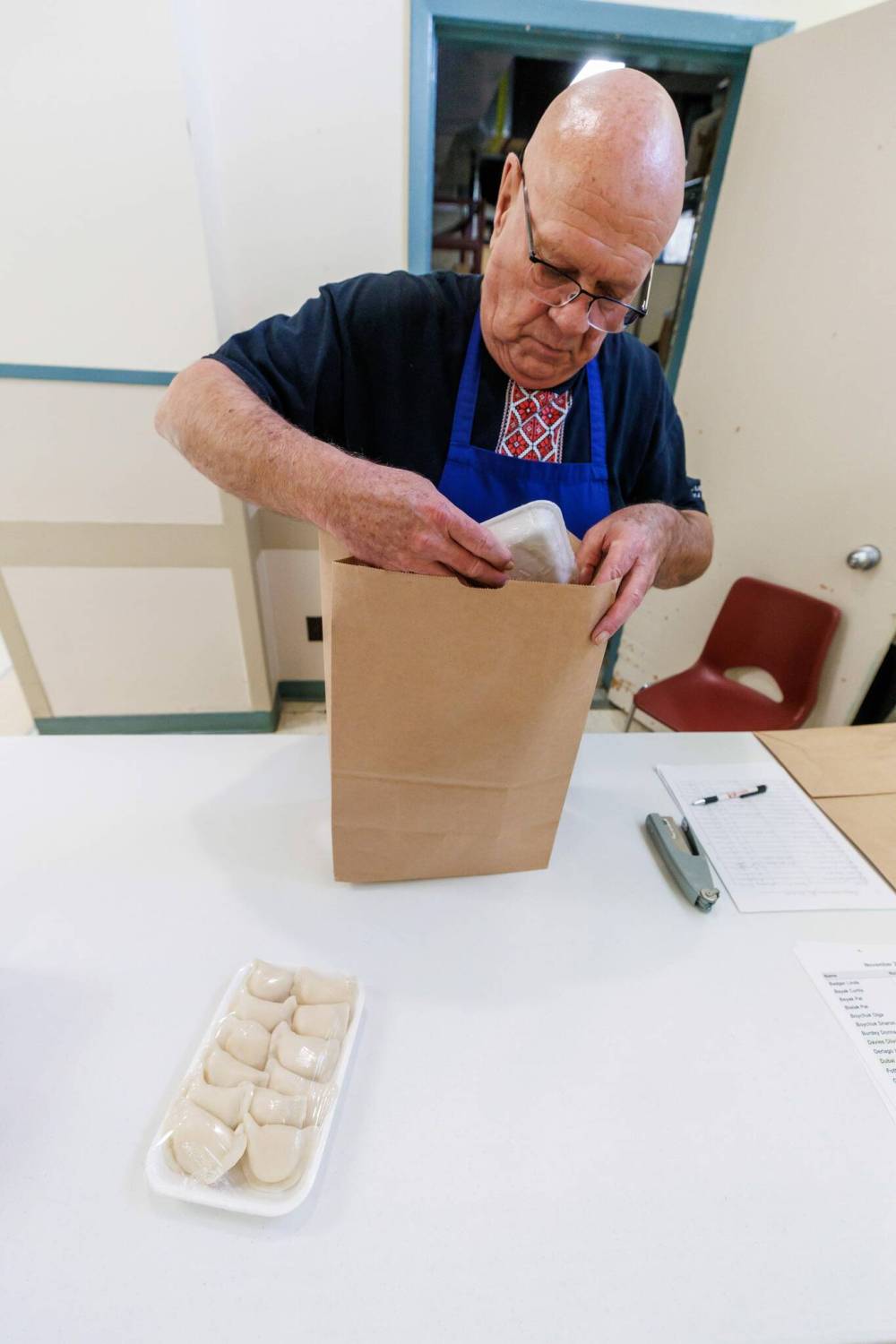
So when Sumka refers to the 60 or so volunteers responsible for St. Joseph’s Ukrainian Catholic Church’s monthly perogy sales as a well-oiled machine, you can take it to the bank.
Sumka attended his first so-called perogy “bee” at the Jefferson Avenue parish about 12 years ago, as an interested observer.
“What struck me immediately was how each group had its own domain… how the dough makers didn’t mess with the ballers, who didn’t mess with the pinchers, who didn’t mess with the cooks.
“I remember thinking, sheesh, these people have project management down to a science,” says Sumka, a “good North End boy” who joined the congregation there in the early 2000s.
Things haven’t changed a whit since Sumka signed on as a packer following his retirement from the fire department.
On a recent Wednesday morning, his hands were a blur as he stuffed container after container of freshly boiled perogies, or pyrohy, into individually labelled brown paper bags, before another volunteer carried the lot to a pickup area steps away from the hall entrance.
Volunteers sit at a long row of tables pinching perogies. (Mike Deal / Free Press)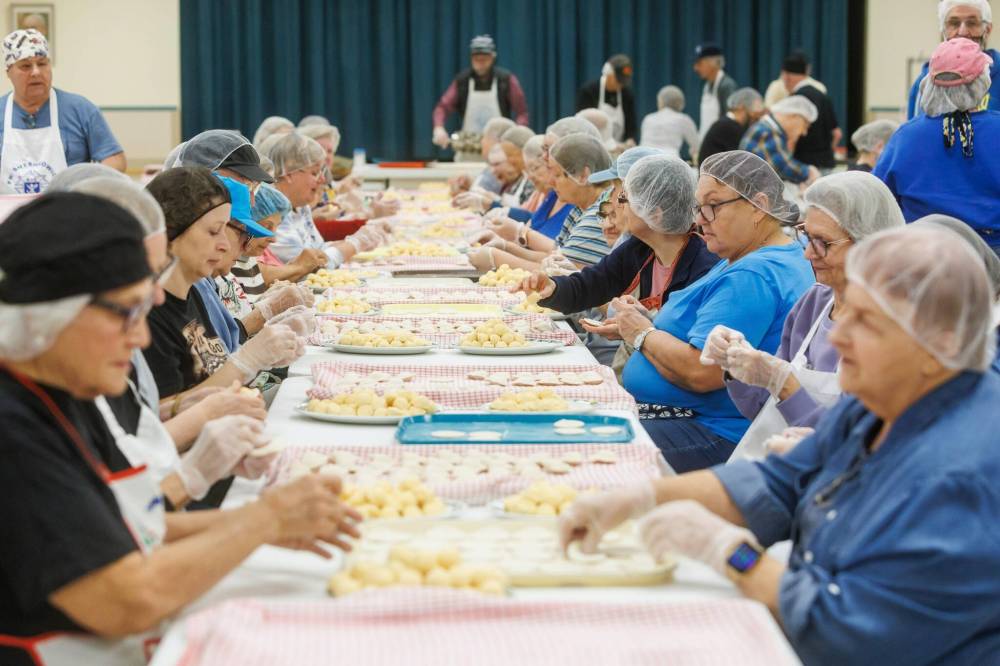
“One of the problems we’re currently running in to is that our perogies are so delicious and, at $8 a dozen, such a great deal that some of our regulars are having trouble getting their orders in on time,” he says, sporting a cloth apron over a dark T-shirt embroidered with a traditional Ukrainian emblem.
“I’m not sure if talking to (the Free Press) is going to make matters worse or not, but I guess it’s like they say: you snooze, you lose.”
Perogies and local church sales go together like, well, perogies and kubasa.
On a near-weekly basis, particularly as the holiday season approaches, places of worship such as Elmwood’s Holy Eucharist Church, St. Basil’s Ukrainian Catholic Church in St. James and North Kildonan’s St. Anne Ukrainian Catholic Church churn out perogies expertly prepared by teams of well-practicsed volunteers.
Revenue from the fundraisers goes toward everything from building upgrades to English classes for recent immigrants.
Dennis Wawrykow adds the ingredients to the large mixer at the dough mixing station. (Mike Deal / Free Press)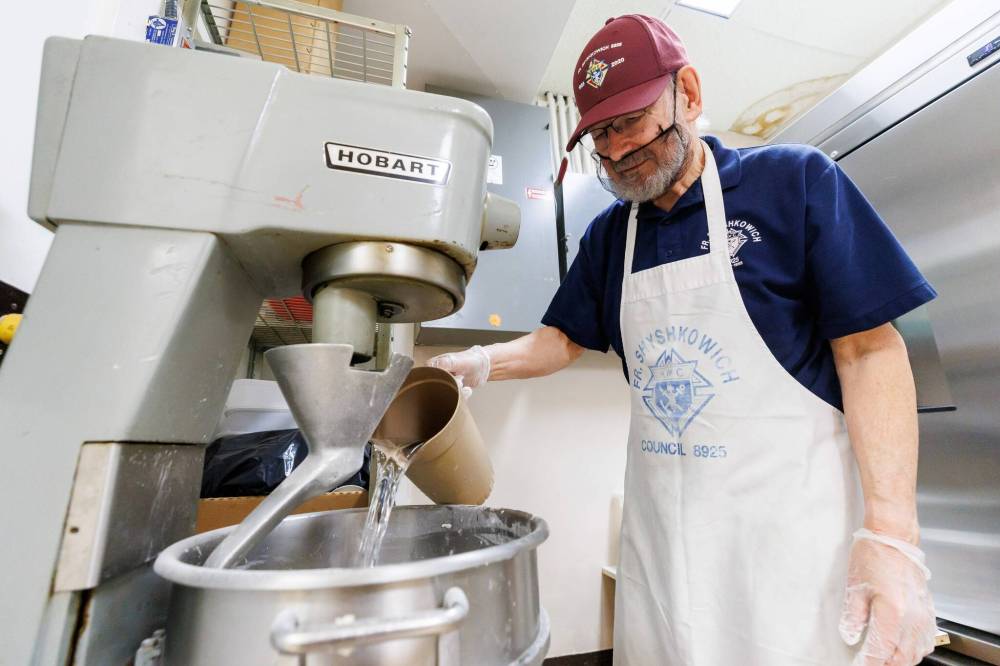
Rick Kendall carries a big ball of dough from the mixing station to the dough balling station. (Mike Deal / Free Press)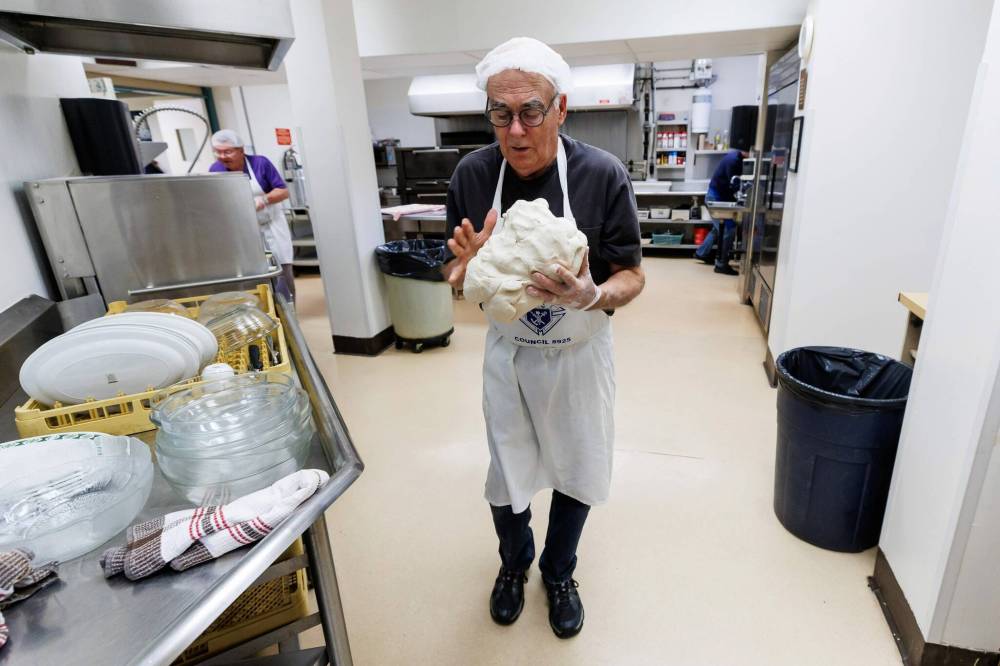
Hazel Kiernicki (left) and Bohdan Wowczuk take a huge ball of dough and break it down into smaller ones that will head to the rolling station. (Mike Deal / Free Press)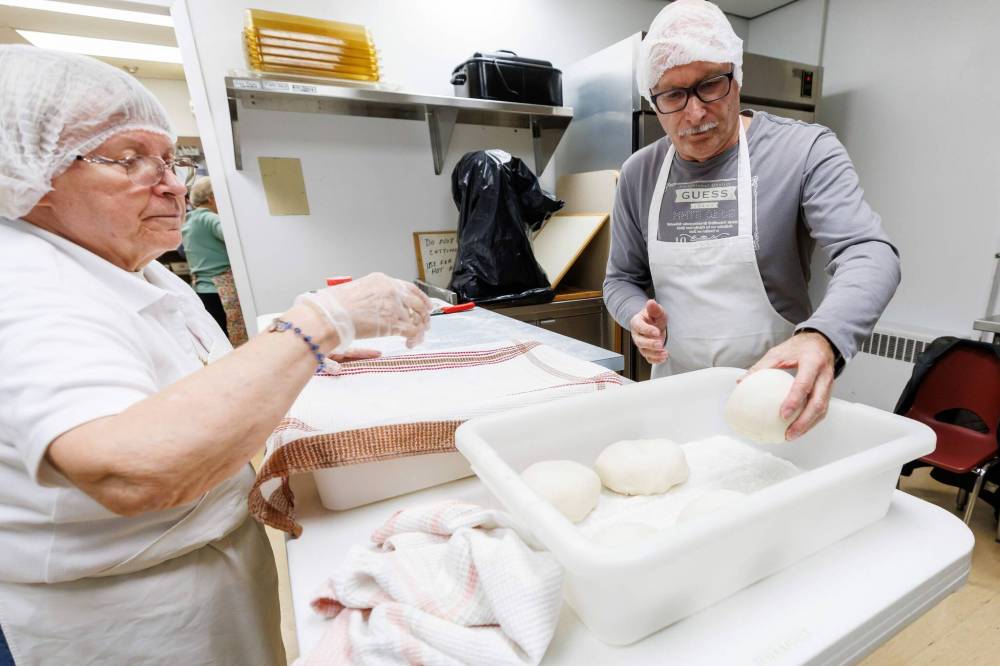
Ron Lukie at the dough rolling station flattens the dough balls out for the cutters. (Mike Deal / Free Press)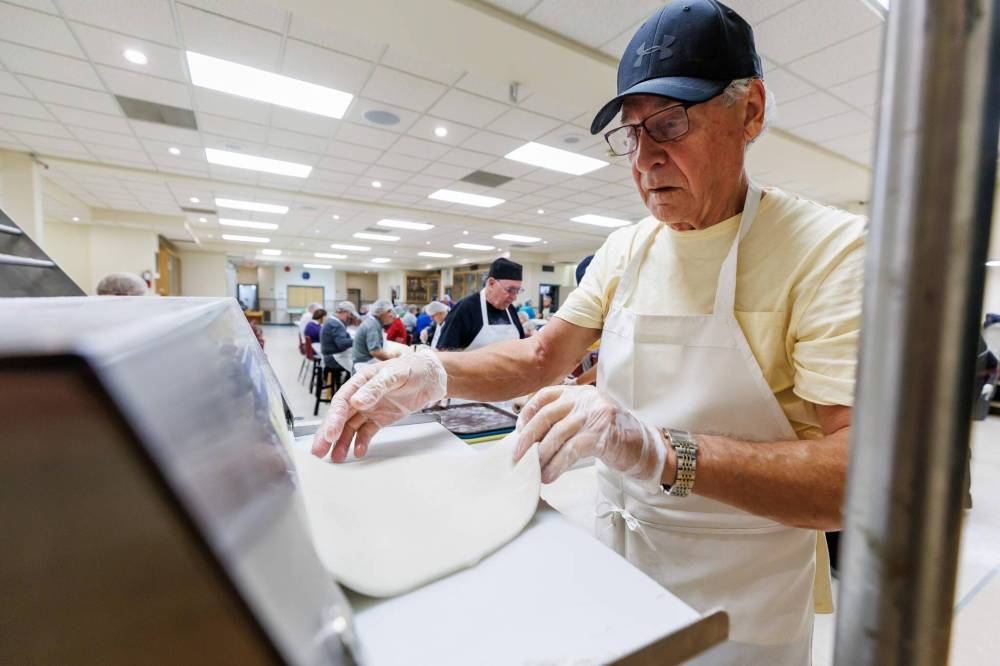
Carol Sawchuk, the self-described perogy boss at St. Joseph’s for three years running, says the spirited affairs serve two other equally important purposes.
First, they grant newcomers from Ukraine a welcome distraction, if only for a few hours, from the war in their homeland.
Additionally, they allow participants, many of whom are seniors, an opportunity to socialize while performing a task that, for the majority of them, is practically second nature.
“You’ll notice that a lot of the older ladies doing the pinching hardly have to look down at their fingers, they’ve been making perogies so long,” Sawchuk says, leading a visitor past a long row of social tables populated by 40 women in hair nets rattling on in English and Ukrainian, while they fold filled dough circles into half-moon-shaped dumplings.
“Not only do they get a chance to chit-chat and catch up, I remember the days when the ladies used to break into song while they were pinching. They bring their friends, their family… for some, this is their big outing.”
A group of volunteers make perogies in the basement of St. Joseph’s Ukrainian Catholic Church on Jefferson Avenue.(Mike Deal / Free Press)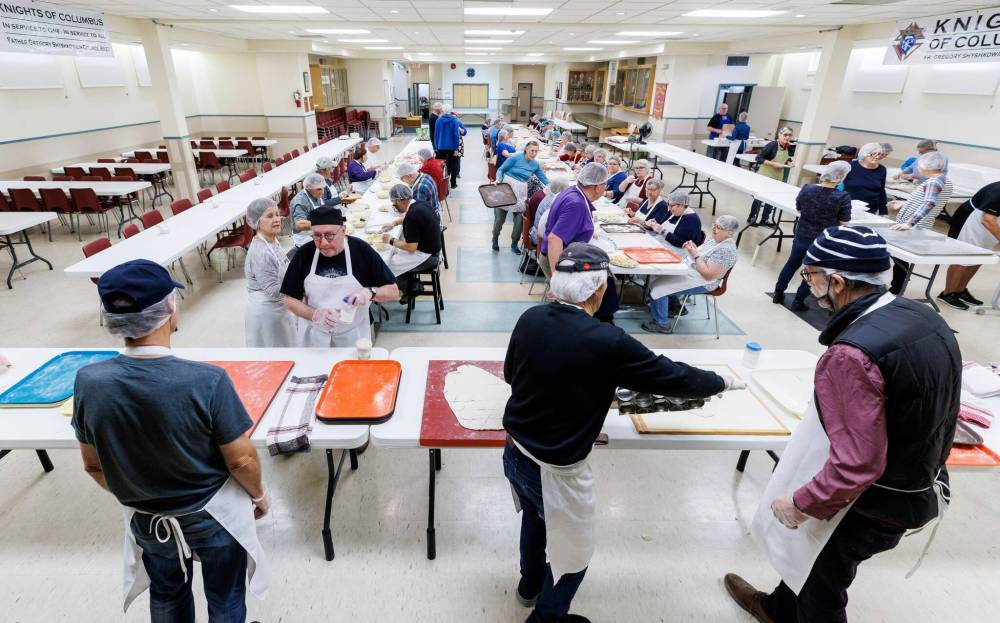
According to Father John Sianchuk, perogy sales at St. Joseph’s, which was founded in 1952, began roughly 35 years ago as a seniors’ project.
Although orders nowadays are capped at 350 dozen per event, he recalls a period in the early 1990s when they were readying four times that number.
“But that got to be ridiculous. People were here from 7 a.m. till well past dinner-time, which was an awful lot to ask of some of the older folks,” he says, mentioning he is no longer able to pitch in the way he once did owing to nerve damage in his right hand, but that he’s always happy to offer spiritual support.
Ron Lukie delivers a sheet of dough for the cutters, Iyvan Michalchyshyn (left) and his brother Joe Michalchyshyn (right). (Mike Deal / Free Press)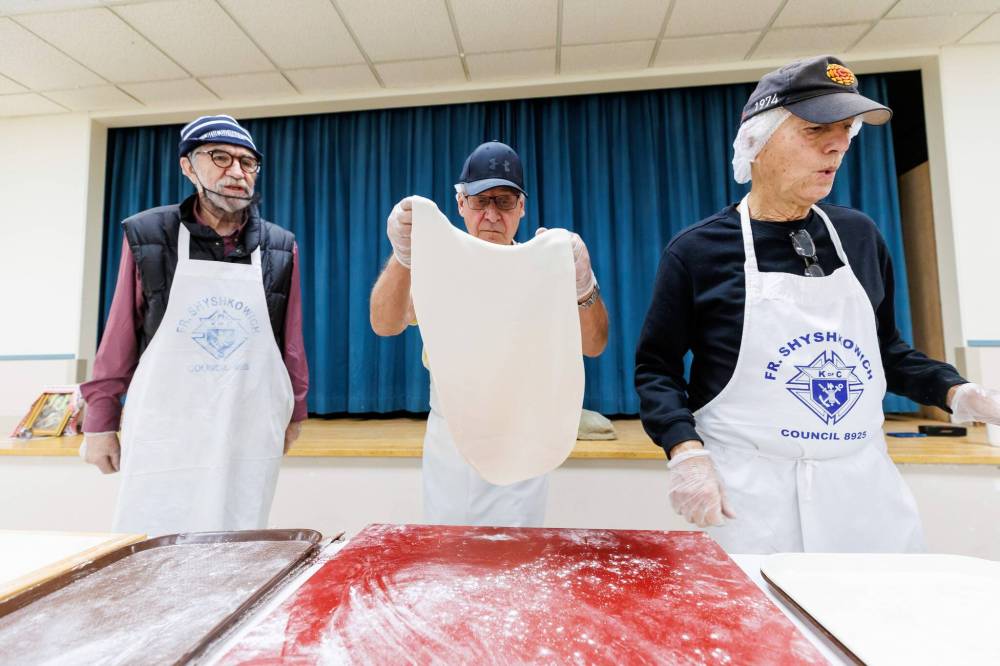
Iyvan Michalchyshyn (left) watches his brother, Joe, roll a custom made cutter across a sheet of dough. (Mike Deal / Free Press)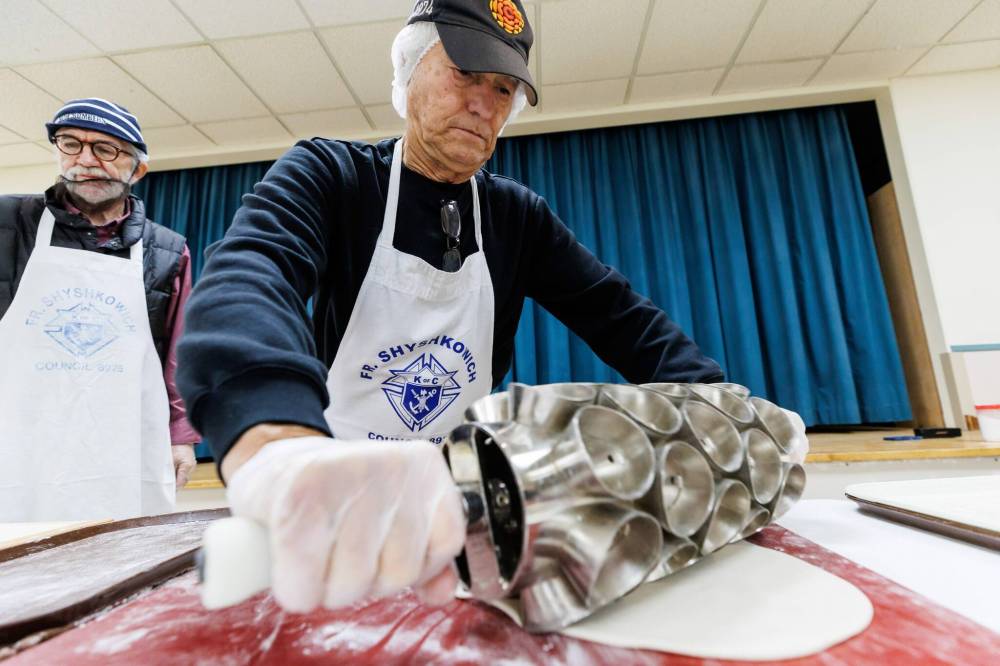
Gary Lukie shakes pieces of dough loose. (Mike Deal / Free Press)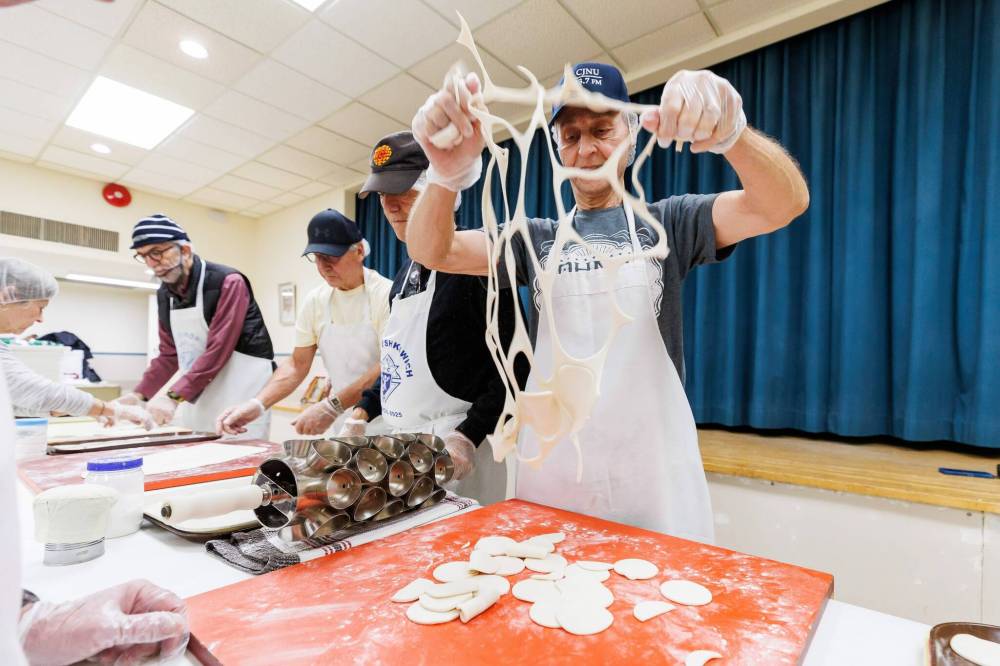
Jozef Popiel (left) and Walter Maszczak (right) make little balls of filling that will be used in the perogies. (Mike Deal / Free Press)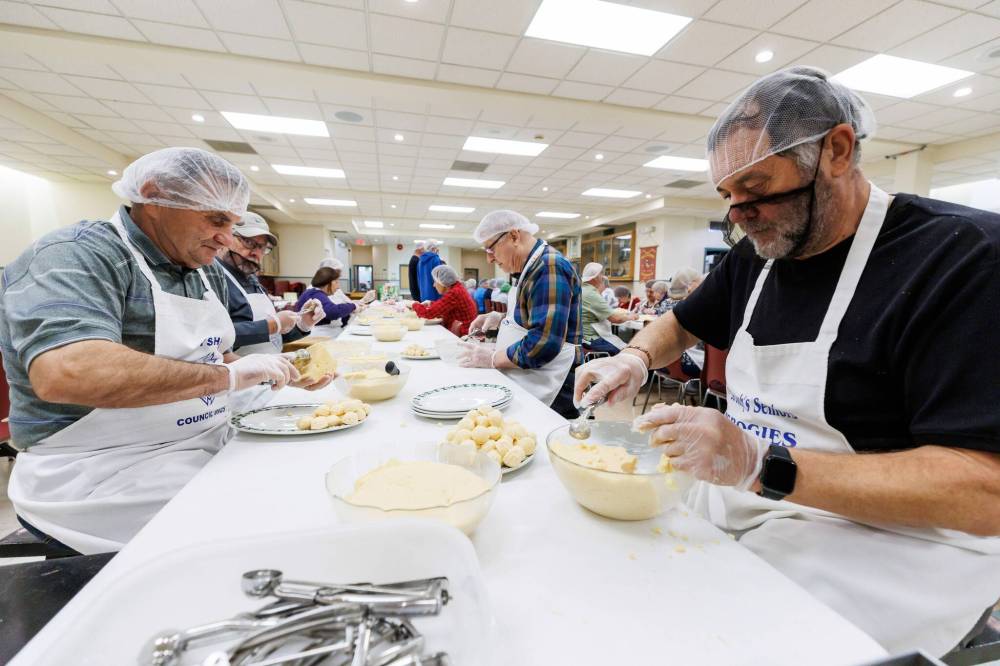
St. Joseph’s perogy bees work like this. On Day 1, generally a Tuesday in the middle of the month, a small contingent of men and women gather to peel and boil spuds, shred cheese and slice onions.
(Sawchuk smiles, saying newfangled varieties of perogies such as pulled-pork, beef-taco and Buffalo-chicken are OK, but nothing beats traditional potato, cheese and onion, especially when paired with a dollop of sour cream.)
The second day, which is when we dropped by, is when things really get going. Dough is prepared in a licensed kitchen area, beginning well before sunrise.
It’s then rolled flat and shaped into uniform-size discs by a fellow equipped with a contraption that would give Hunky Bill a run for his varenyky money.
Jozef Popiel makes little balls of filling that will be used in the perogies. (Mike Deal / Free Press)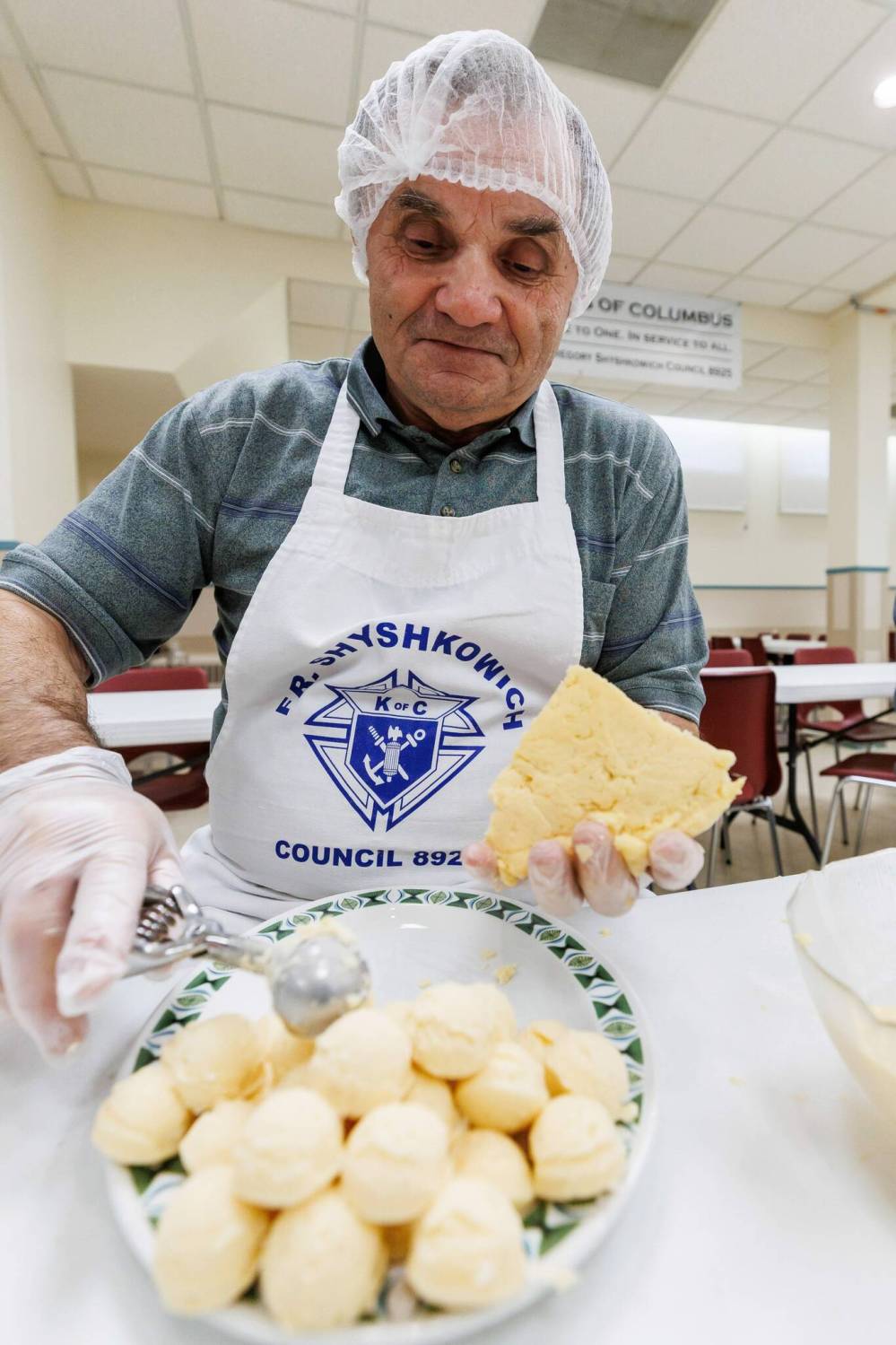
Next, the discs are handed over to a squad of six guys and gals whose sole duty is to top each with the potato-cheese-onion mixture using a long-handled cookie-dough scoop.
The pinchers take over from there. Once they have filled a tray with three dozen perogies, they raise their arm or call out to a separate volunteer, who transports their output to the kitchen to be boiled, then packaged.
Then they alert somebody else that they need more perogies to pinch.
“Customers begin arriving around 10 a.m. to pick up their orders and by two in the afternoon, we’re pretty much done,” Sawchuk says, noting the minimum order is two dozen, and the maximum is 10 dozen.
“We don’t keep official records but I know for a fact that we get people from all over the city coming here for perogies, church members and non-members alike.
“And while they’re picking up, many of them tell us to mark them down for another five dozen, next month.”
Moments after Father John temporarily pauses the proceedings to lead everyone through a chorus of Happy Birthday to You followed by the Ukrainian song Mnohaya Lita (God Grant You Many Happy Years) in honour of longtime volunteer Mary Hykawy, the birthday gal is taking a much-deserved breather from her pinching station.
Hykawy, 85, grew up in the Gimli area. While she can’t state for a fact how old she was when her mother taught her how to make perogies — “Let’s just say it was quite a while ago” — she is pleased to report she has been part of the perogy brigade at St. Joseph’s since the get-go.
Darlene Sidak pinches perogies. (Mike Deal / Free Press)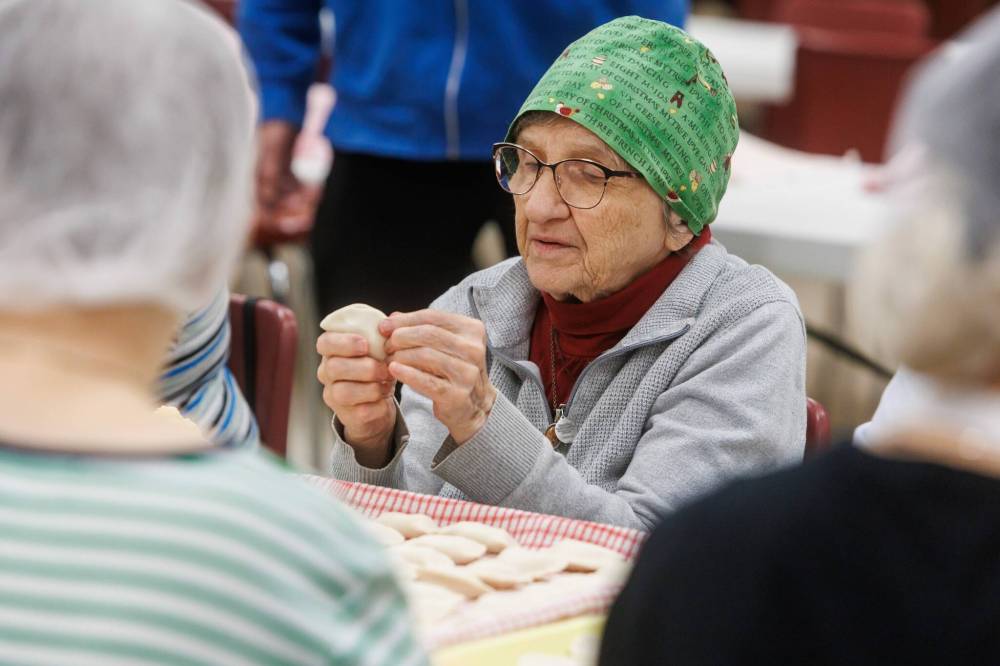
George Gaba pours boiled perogies into a bowl of cold water to cool them down so they can be packaged up for sale.(Mike Deal / Free Press)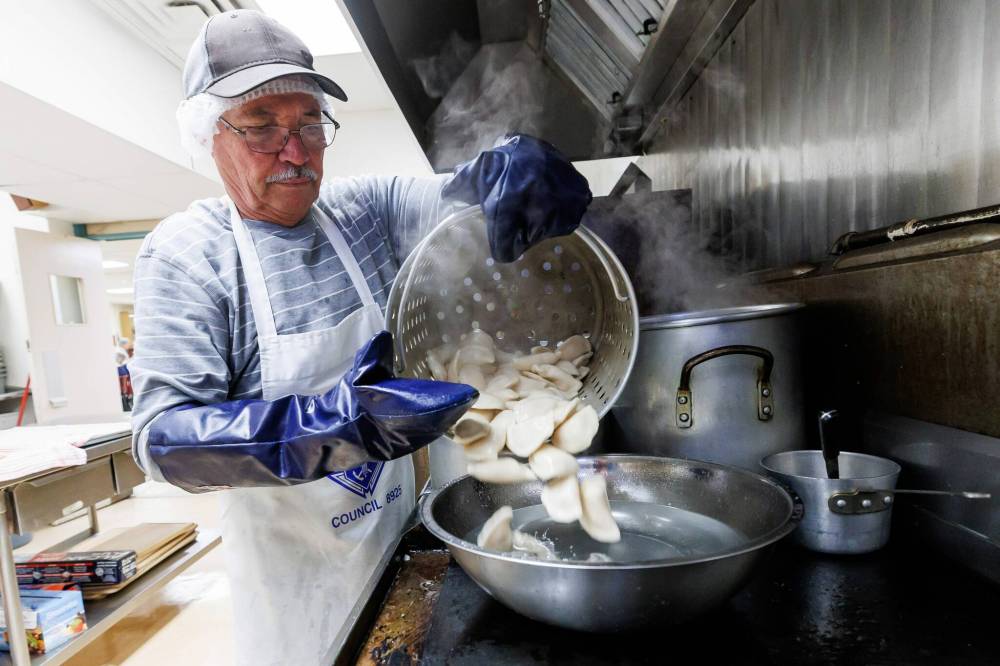
Michael Hrechka delivers a batch of cooked and cooled perogies to the next station for quality control and packaging. (Mike Deal / Free Press)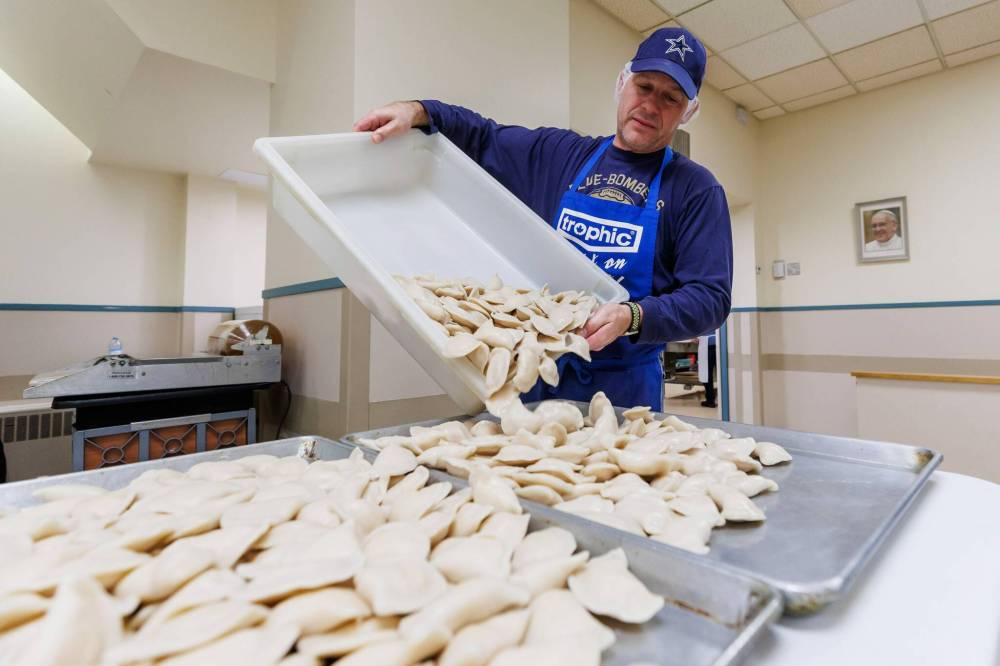
Betty Swerhen and Patricia Clapa put perogies onto trays of a dozen, culling out ones that don’t make the grade. (Mike Deal / Free Press)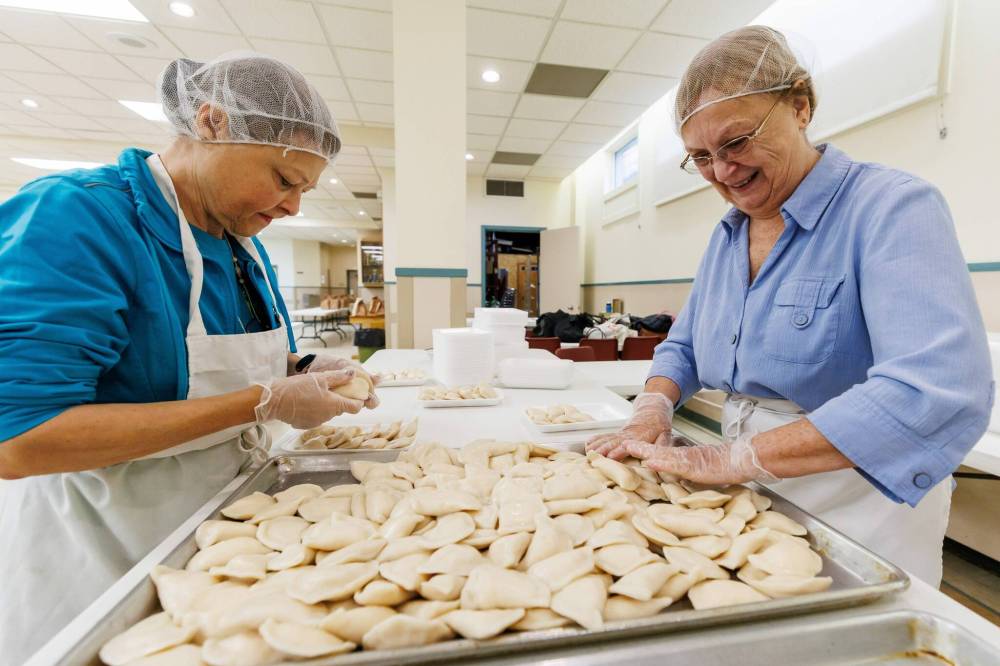
“I’ve always made my own at home — usually sauerkraut, but sometimes white cheese-and-potato — so when they first came up with the idea (for perogy sales) I said of course I would help,” she says, reaching for a slice of banana bread from a table laden with homemade treats earmarked for the worker bees.
As for quotas, Hykawy shoots us a quizzical look when it’s mentioned that 350 dozen perogies works out to 4,200 perogies, or just over 100 per pincher, given today’s turnout.
“Personally, I don’t count how many I make, but that number sounds a little low,” she says.
“Some of us are faster than others, of course, but even at my age, I’m able to hold my own without any problems.”
Dennis Beyak wraps the perogies in plastic wrap. (Mike Deal / Free Press)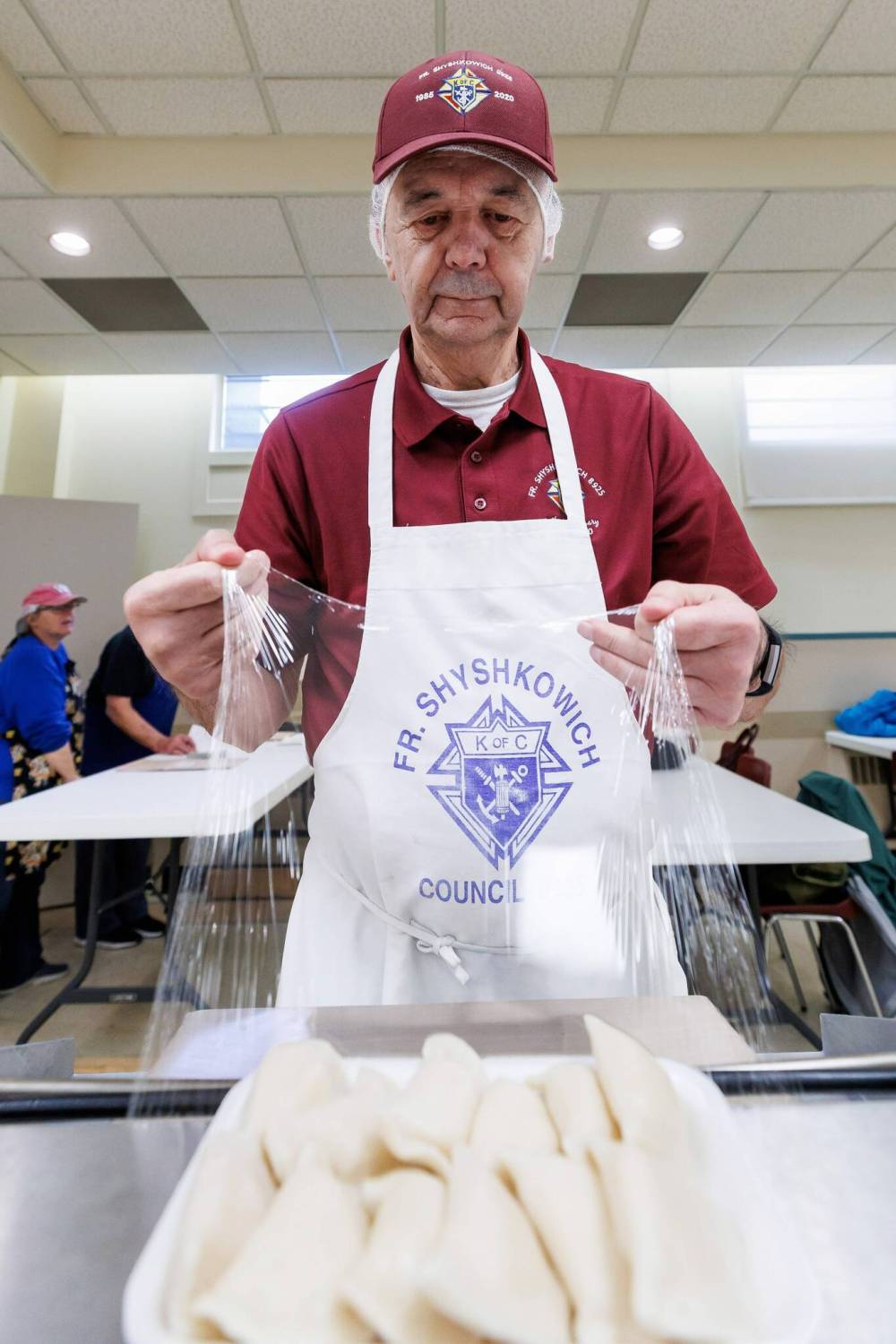
Back at the packing station, Sumka says a perogy sale slated for Dec. 11 is already completely sold out, so interested parties will have to wait until February — they take a break during January, as well as from June to August — to place an order.
He chuckles, recalling an evening when his now-wife Donna invited him over for dinner, after promising him a special menu.
“When I arrived, there were flowers all over the place and in the dining room were two dozen perogies she’d done from scratch,” he says.
“She told me how it had taken her five hours to make them, and how much work it had been, to which I responded, ‘Thank you very much, they look absolutely delicious, but if you ever want to use your time more wisely, I can definitely tell you where to go for perogies.’”
david.sanderson@freepress.mb.ca
Stephen Sumka is one of the volunteers taking part in the St. Joseph’s Ukrainian Catholic Church perogie “bee,” which has been going on for years, ahead of the holidays. (Mike Deal / Free Press)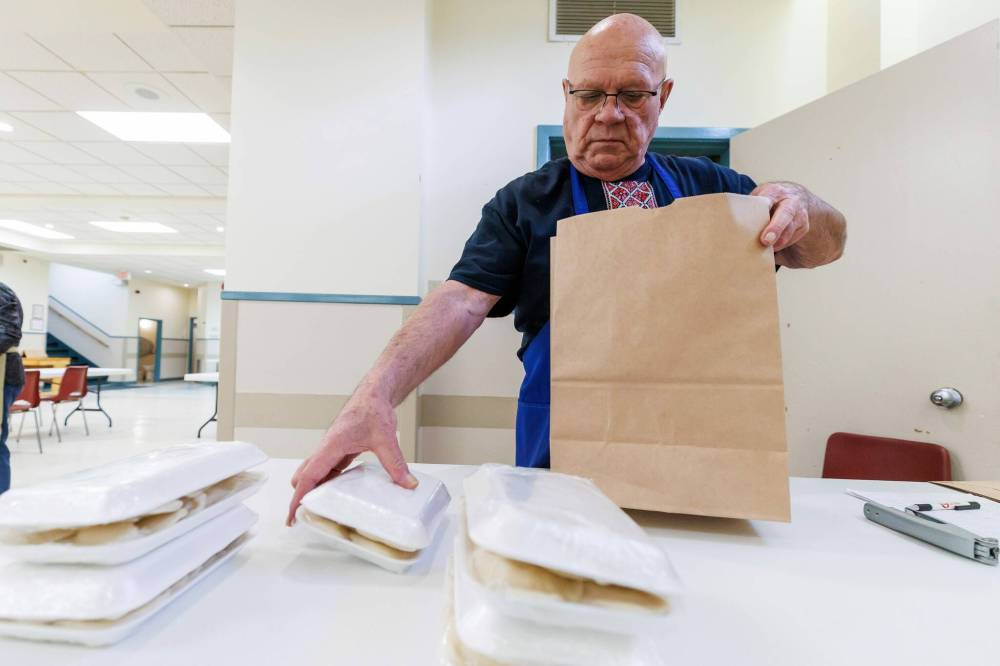
Dave Sanderson was born in Regina but please, don’t hold that against him.
Our newsroom depends on a growing audience of readers to power our journalism. If you are not a paid reader, please consider becoming a subscriber.
Our newsroom depends on its audience of readers to power our journalism. Thank you for your support.
